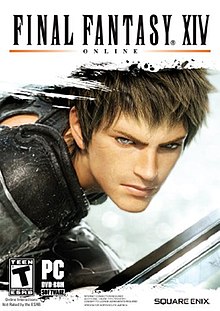
Back فاينل فانتسي 14 (لعبة فيديو 2010) Arabic فاينل فانتسى XIV ARZ Final Fantasy XIV Danish Final Fantasy XIV German Final Fantasy XIV Spanish فاینال فانتزی ۱۴ Persian Final Fantasy XIV (vuoden 2010 videopeli) Finnish Final Fantasy XIV French Final Fantasy XIV ID Final Fantasy XIV Italian
| Final Fantasy XIV | |
|---|---|
 North American cover art, featuring artwork of a male Hyur. | |
| Developer(s) | Square Enix |
| Publisher(s) | Square Enix |
| Director(s) |
|
| Producer(s) |
|
| Designer(s) | Nobuaki Komoto[a] |
| Artist(s) | Akihiko Yoshida |
| Writer(s) | Yaeko Sato |
| Composer(s) | |
| Series | Final Fantasy |
| Engine | Crystal Tools |
| Platform(s) | Windows |
| Release | September 30, 2010 |
| Genre(s) | Massively multiplayer online role-playing game |
| Mode(s) | Multiplayer |
Final Fantasy XIV[b] was a 2010 massively multiplayer online role-playing game (MMORPG) for Windows, developed and published by Square Enix. It was the original version of the fourteenth entry in the main Final Fantasy series and the second MMORPG in the series after Final Fantasy XI. Set in the fantasy realm of Eorzea, players took control of a customized avatar as they explored the land and were caught up in both an invasion by the hostile Garlean Empire and the threat of the primals, the deities of the land's beastmen tribes. Eventually, they were embroiled in a plot by a Garlean Legatus to destroy the primals by bringing one of the planet's moons down on Eorzea.
Final Fantasy XIV had been in development since 2005 under the codename "Rapture", and was announced in 2009 for Windows and the PlayStation 3 video game console. It ran on Square Enix's Crystal Tools middleware engine, which was adjusted to suit the game's specifications. During development, the team carried over multiple aesthetic elements from Final Fantasy XI while attempting to create something that stood on its own. Due to several factors, the development was beset by problems that would later have drastic effects on the game. Attempts to bring the game to Xbox 360 consoles fell through due to disagreements with Microsoft about the use of Xbox Live.
After its alpha test and a delayed beta test, the game went live on September 30, 2010, remaining active until its servers were closed on November 11, 2012. At launch, the game was met with a negative response: while the graphics and music were praised, other aspects were unanimously panned, including the gameplay, interface, and the general impression of the game being unfinished. Critic and fan backlash caused Square Enix to suspend subscription fees, indefinitely postpone the PlayStation 3 version, and replace the development team leadership, with Naoki Yoshida brought in as producer and director. Yoshida decided to make marginal improvements before the game's shutdown, ultimately replacing it with a new version initially subtitled A Realm Reborn, which met with a favorable reception upon its release.
Cite error: There are <ref group=lower-alpha> tags or {{efn}} templates on this page, but the references will not show without a {{reflist|group=lower-alpha}} template or {{notelist}} template (see the help page).